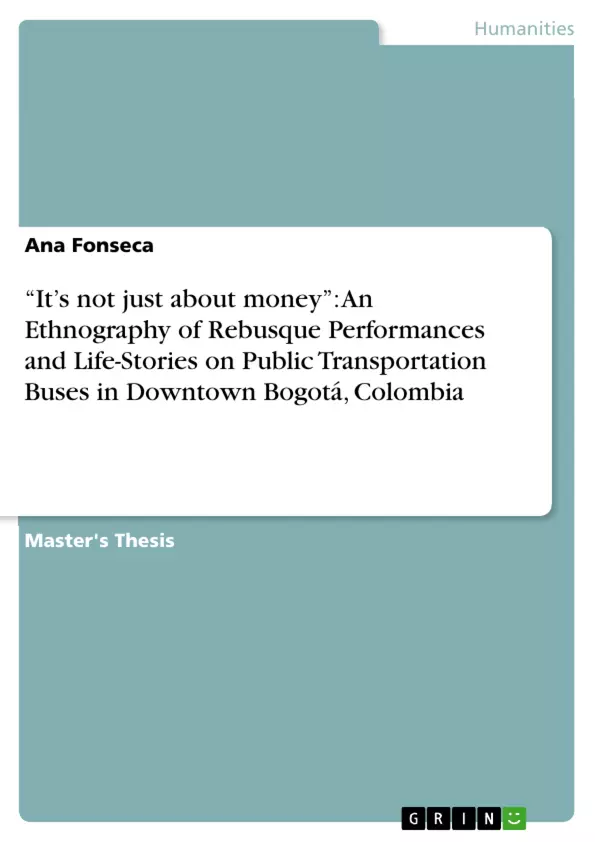This research focuses on the performances of peddlers, buskers and panhandlers who are said to practice "rebusque" on the main transportation system of downtown Bogotá, Colombia. Rebusque refers to informal workers who forge self-employment to make a living. Through rebusque performances on the buses, such workers challenge misleading perceptions of their work, offer social critiques, and forge relations of solidarity with bus drivers and riders. This solidarity emerges from Colombians' shared nationalist and religious beliefs paired with their broad dissatisfaction with their country's socio-economic order and neoliberal government. Following Ortner's idea of "serious games," De Certeau's notion of "tactics" and Merleau-Ponty's phenomenology, I examine rebusque performers' "self-reliance" as a form of "social agency" accrued by negotiating earnings through expressions of religious and nationalist critiques and aspirations which inspire collective participation. Thus, "informal workers," often refugees from Colombia's rural violence, gain peaceable earnings within Bogotá’s buses.
Table of Contents
Chapter 1: Introduction
1.1. Venturing Out on the Buses
1.2 Context and Social Significance: Research Particularities and Performance Conditions
1.3 Methodological Approaches and Ethics
1.4 Ethnographic and Theoretical Background
1.5 Research Questions
1.6 Chapter Outline
Chapter 2: Spatio-Temporal Dimensions of Rebusque
2.1 The Space of the Bus within Urban and Public Spatialities
2.2 Pursuing and Getting on the Bus: Time and Relations with Bus Drivers
2.3 Relationships Between Bus Riders and Rebusque Workers
Chapter 3: Rebusque on the Buses is for More than Monetary Gain: Informal Workers Acting Against Conventional Misperceptions of their Work
3.1 Challenging the Criminality Perception
3.2 Challenging Widespread Misconceptions of Deceit and Lack of Hygiene in Rebusque
3.3 Addressing Conflicting Ideas of Rebusque as a Form of Work
Chapter 4: Beyond Monetary Gain: Rebusque on the Buses as Social Critique
4.1 Bus Performances as Informal Workers’ Expressions of Social Critique
4.2 Moral Economies and Bus Rebusque: Social Expectations for the State, and Workers who Want Formal Employment
4.3 Recent Neoliberal Labour Reform and State Interventions: Changing the Meanings of Formal and Informal Sectors
Chapter 5: Neoliberalism and Expressions of “Self-Reliance” and “Resilience” as negotiated through the Social Relations of Solidarity in Bus Rebusque
5.1 Solidarity as Emergent from People’s Shared Conditions across Colombian Space and Time
5.2 Solidarity as Shaped by Nationalist Sentiments Evoked in Rebusque
5.3 Religious Beliefs as Sources of Solidarity in Rebusque
Conclusions and Suggestions for Further Research Ill
References
Frequently Asked Questions
What does the term "rebusque" mean in Colombia?
Rebusque refers to informal self-employment where workers, such as street peddlers or buskers, forge their own jobs to make a living in a precarious economic environment.
How do rebusque performers use Bogotá's buses as a social space?
Performers use the bus as a stage to challenge negative perceptions of their work, offer social critiques, and build solidarity with drivers and passengers through shared cultural and religious values.
What is the relationship between rebusque and neoliberalism?
Informal workers often express dissatisfaction with the country's socio-economic order and neoliberal reforms, using their performances to voice aspirations for a more just moral economy.
Why is solidarity important for these informal workers?
Solidarity from passengers and drivers, rooted in shared nationalist and religious beliefs, allows performers to earn a peaceful living and counter perceptions of criminality or deceit.
Who are the people practicing rebusque in downtown Bogotá?
Many are internal refugees from rural violence in Colombia who turn to informal urban work as a form of self-reliance and social agency.
- Quote paper
- Ana Fonseca (Author), 2010, “It’s not just about money”: An Ethnography of Rebusque Performances and Life-Stories on Public Transportation Buses in Downtown Bogotá, Colombia, Munich, GRIN Verlag, https://www.grin.com/document/281110



